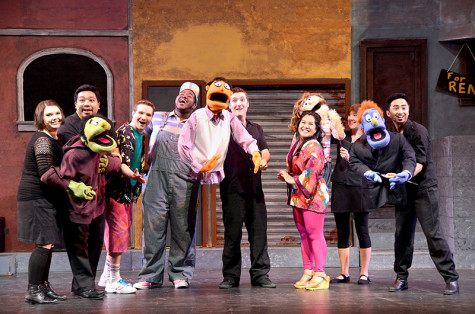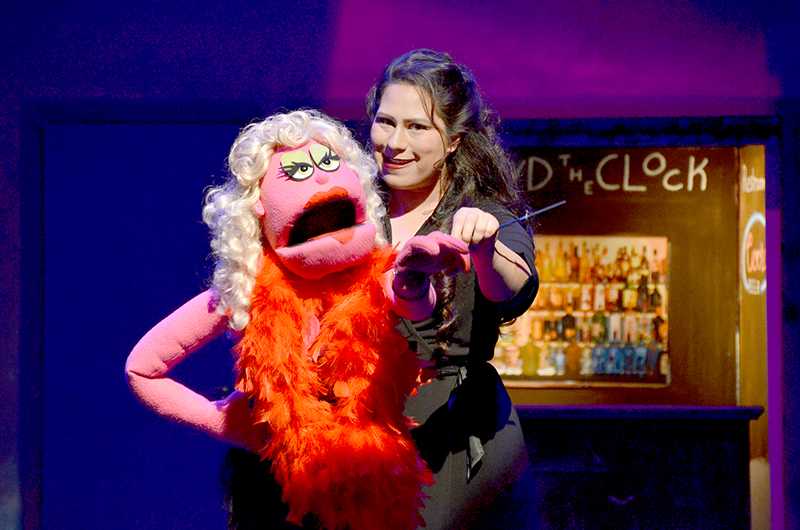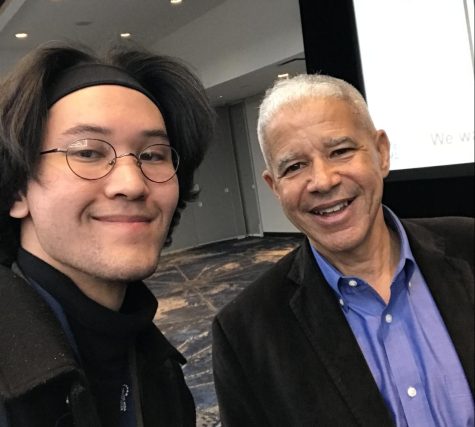Broadway musical ‘Avenue Q’ comes to campus
The winter musical “Avenue Q” opened Friday night in the University Theatre at California State University, East Bay. The Tony Award-winning musical features both human characters and puppets played by unconcealed puppeteers in an adult-themed parody of the PBS show “Sesame Street.”
“Avenue Q” uses the format of an adult educational musical to tell the story of a rundown street in San Francisco. The use of music and multimedia cartoon skits gives the play a feeling of light-hearted satire, while it takes on taboo subjects like racism, sexuality, and existential doubt.
“‘Avenue Q’ was the first musical I ever listened to,” said actor and puppeteer Burton Weaver, who plays the protagonist Princeton. “I feel like it is a show everyone can listen and relate to.”
The play begins with Princeton having just completed his four years with a Bachelor of Arts in English, and finally entering the real world with no money, job, or specific skills. This leads to the first individual number, “What Do You Do with a B.A. in English?”
Each resident on the street has his or her own form of self-doubt, including the landlord Gary Coleman, which is expressed in the next number, “It Sucks To Be Me.”
While being a coming of age tale, it is just as much a love story between Princeton and Kate Monster, played by junior Leslie Tommone, both scared of the real world after college.
Director Marc Jacobs has been part of 11 productions here at CSUEB. When he saw previews of the play in 2003, he said he had low expectations. Upon seeing the play in full, he decided that the opportunity to direct this production at the campus level was one that he could not pass up.
“It has this wonderful mixture of innocence and naivety, while it is pretty close to R-rated, yet you can get away with that since it’s puppets,” explained Jacobs.
None of the cast had previously worked with puppets on stage, which posed an issue initially. But the talented performers learned quickly, starting puppet practice before any kind of singing or choreography.

“I had never worked with puppets before and that was a challenge, so I brought in [Jasen Jeffery] who is a real puppet master and he worked with the kids for three days while I was committed to another show,” said Jacobs “So I came in and the kids were already very adept to the puppetry.”
The play featured CSUEB students Leslie Tammone, Wendy Amador, Daniel Banatao, Nick Berk, Beth Ashley Campbell, Destiney Coleman, Adrienne Hernaez, Marie Alexandra Ibarra, Grace Ortega, Sandy Young-Cellilo, Tristan Scheving, Rebecca Soltau, and Jasmine Williams, along with others from schools in the Bay Area.
“The energy was crazy tonight, everyone really let loose,” said senior Wendy Amador who played Lucy the Slut, “we needed an audience; we needed people to laugh, because the jokes were starting to get old.”
The audience responded with overwhelming laughter and applause throughout. Freshman attendee Blake Weaver called it, “One of the best college performances I have seen.” Crowd favorites included, “The Internet Is for Porn” and “Everyone’s a Little Bit Racist.”
“They are just so honest, people really aren’t color blind, but that does not mean it is always a harmful thing. And come on, that’s all men do on the Internet,” said audience member Kaya Carr about her two favorite songs.
“Avenue Q” is CSUEB’s only production for the winter quarter and will be showing Friday and Saturday, March 14 and 15, at 8 p.m., along with a matinee Sunday, March 16 at 2 p.m. in the University Theatre. Tickets are $20 for the general public, $15 for seniors and non-CSUEB students, and $10 for current students with ID.
“When people actually experience [theatre] they realize there is nothing quite like it, it is an experience unique to each particular time it is performed,” said Jacobs, “The audience is affecting things and where they laugh actively changes the show.”


















